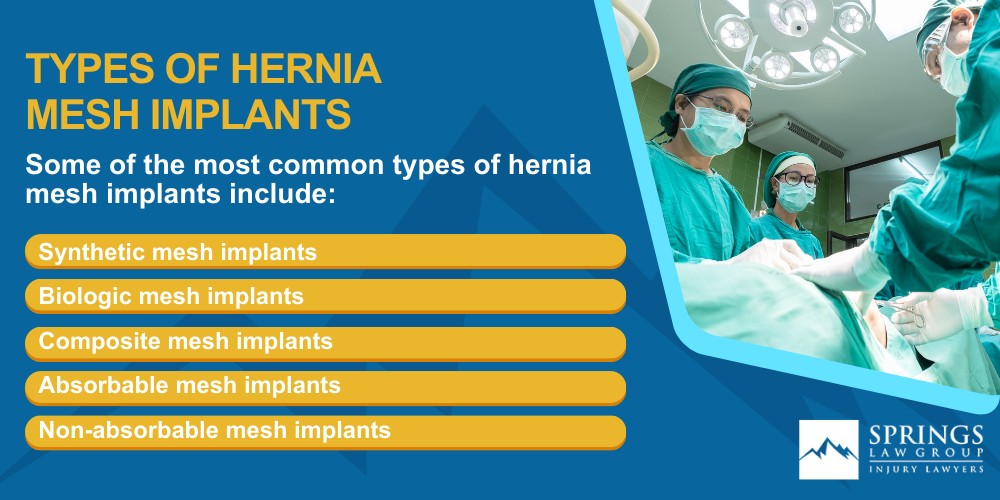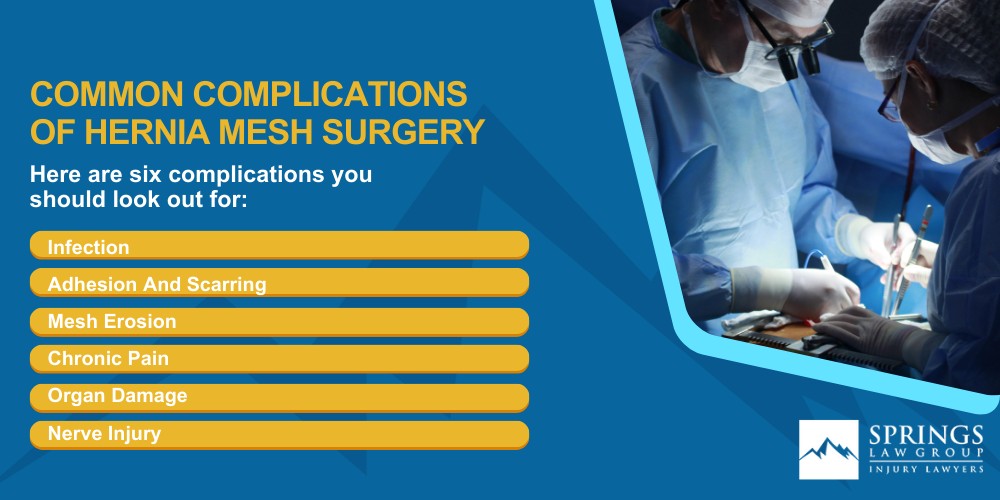Hernia Mesh Lawsuit — 6 Complications to Watch Out for After Surgery

Hernia mesh surgery is a common procedure used to repair weakened or damaged tissue in the abdominal wall. While using mesh implants has become a standard practice in hernia repair, some patients have experienced serious complications that have led to lawsuits against mesh manufacturers.
Hernia mesh litigation is becoming a tangled web of complications and distress. From foreign bodies to infection, the risks associated with hernia repair surgery can be daunting for those considering it an option.
This article will explore six common complications you must watch out for after hernia mesh surgery and where to get help with your case.
Background on Hernia Mesh Lawsuits
Hernia mesh lawsuits are civil cases against Atrium, Ethicon, C.R. Bard, and any other hernia mesh manufacturer that makes products that may cause harm during surgery. Injury victims are seeking damages for pain and suffering, mental anguish, medical bills, lost wages, emotional distress, and other costs associated with hernia mesh injuries from the malfunctioning product.

Complications from these surgeries are often caused by defective meshes used during an operation, leading to severe health issues, including infection, tissue adhesion, organ damage, and obstruction of bodily fluids. These lawsuits are headed by hernia mesh lawyers and their clients across the country.
There are no average hernia mesh settlement amounts. However, if you or someone you love has been negatively affected by these defective devices, contact a hernia mesh attorney to determine how much you may be entitled to.
Types of Hernia Mesh Implants
A hernia mesh implant is a medical device surgically implanted to support weakened or damaged tissue, preventing hernias from recurring. There are different types of hernia mesh implants, and the choice of the mesh depends on various factors, including the type of hernia, the size of the hernia, the patient’s age, and overall health.

Some of the most common types of hernia mesh implants include:
- Synthetic mesh implants
- Biologic mesh implants
- Composite mesh implants
- Absorbable mesh implants
- Non-absorbable mesh implants
Patients should discuss their options with their surgeon and understand the risks and benefits of each type of hernia mesh implant before deciding on the most appropriate one.
Common Complications of Hernia Mesh Surgery
Like any surgical procedure, hernia mesh surgery carries risks and potential complications. While many surgeries are successful, complications can occur in some hernia mesh cases.

Here are six complications you should look out for.
#1 Infection
Infection is an all-too-common complication from hernia mesh surgery that can lead to further medical problems if left untreated.
In some cases, it can manifest as a localized redness or swelling near the surgical site. In other cases, it may cause fever and chills throughout the body.
Additionally, if bacteria are present on the implantable material used during surgery, there is a risk of infection spreading throughout the body (sepsis). If this happens, hospitalization may be required, followed by antibiotics therapy to kill any lingering bacteria.
#2 Adhesion and Scarring
Adhesions and scarring after hernia mesh surgery are unfortunately quite common and can cause pain, discomfort, and difficulty with mobility for patients.
When adhesions form, strands of tissue start to stick together along the surgical site. In some cases, these bands of fibrous tissue may even attach nearby organs or muscles to each other. This can lead to further inflammation and swelling, potentially requiring more surgeries to correct.
Patients must pay close attention to their recovery process, so they’re able to identify any issues as early as possible.
#3 Mesh Erosion
Mesh erosion is a potentially serious complication that can occur following hernia mesh surgery. It happens when the mesh implant gradually breaks down and erodes through the surrounding tissue, causing pain and inflammation and potentially leading to infection or other complications.
Mesh erosion is often caused by the improper placement of the mesh or a defective or incompatible mesh implant.
Symptoms of mesh erosion can include:
- Pain
- Tenderness
- Redness
- Swelling at the surgical site
- Fever
- Nausea
- Vomiting
In some cases, the mesh may erode through the skin, causing an open wound that requires additional treatment.
#4 Chronic Pain
Chronic pain is a common complication of hernia mesh surgery, and it can have a lasting impact on the patient’s life. It’s like getting stuck in quicksand—the more you struggle to get out, the deeper you sink.
This discomfort can range from mild or moderate to severe or debilitating. Many people live with ongoing, low-level aching in the abdominal area; others experience sharp pains when they move around too much or attempt to lift heavy objects. Patients also often report sensations such as burning and itching near the implantation site.
Not only can this cause immense physical suffering, but it may also lead to mental anguish associated with depression and anxiety if left untreated over long periods.
#5 Organ Damage
Organ damage may arise when the body attempts to reject newly implanted material like hernia mesh or due to infection caused by bacteria entering through surgical incisions. This can lead to inflammation, scarring, and potential injury or malfunctioning in organs near where the implant was placed.
In some cases, open abdominal repair surgeries are needed if significant organ damage has occurred due to hernia mesh complications. Therefore, it is important for patients undergoing this procedure to take special care concerning post-operative monitoring so as not to overlook any signs of infection or other severe issues related to their condition.
#6 Nerve Injury
Nerve injury caused by hernia mesh implants may occur as a result of either direct or indirect trauma.
Direct trauma occurs when the implant causes physical damage to surrounding nerves due to its size, shape, and placement within the body. Indirect trauma results from swelling or inflammation caused by infection in the operative area.
In both cases, severe pain can result, as well as numbness and tingling sensations throughout the affected region. If not addressed quickly and properly, long-term neurological problems like muscle weakness or paralysis could arise.
Looking to File a Hernia Mesh Lawsuit? Call Springs Law Group.
The potential complications of hernia mesh surgery are serious and should not be taken lightly. While the medical devices used during the procedure may have been designed to help with the healing process, they can lead to a host of unexpected issues that could cause further health problems down the line.

At Springs Law Group, our attorneys represent victims and their families in hernia mesh class action lawsuits nationwide. If you or someone you know has been affected by defective hernia mesh devices, contact an experienced hernia mesh lawyer today.
